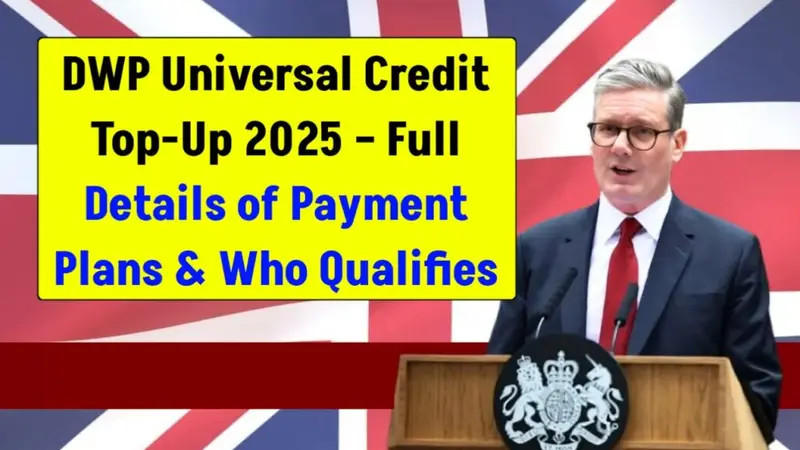Hello readers, the Department for Work and Pensions (DWP) has confirmed changes to Universal Credit in 2025, including a new top-up scheme that aims to provide extra financial support to those who need it most. This update has created quite a buzz among benefit claimants in the UK, as many are eager to know how much they can receive, who is eligible, and when payments will arrive. In this article, we will break down all the essential details about the Universal Credit Top-Up 2025, covering payment plans, qualifying criteria, and how to apply.
What Is The Universal Credit Top-Up 2025
The Universal Credit Top-Up 2025 is an additional payment provided on top of the regular Universal Credit benefit. This new measure is designed to help low-income households manage rising living costs, including food, energy, and rent. It will be paid directly by the DWP and will not replace your regular Universal Credit entitlement but rather add to it. This scheme is part of the government’s plan to provide targeted support in a year where inflation and cost-of-living pressures are still impacting millions.
Why The Top-Up Is Being Introduced
The UK has faced significant economic challenges over the past few years, with energy bills, food prices, and general household costs climbing sharply. Even with the cost-of-living payments made in previous years, many families have struggled to keep up. The DWP’s top-up for 2025 aims to bridge this gap, ensuring that vulnerable groups have enough financial breathing space. It also reflects the government’s focus on targeted aid rather than broad, one-size-fits-all assistance.
How Much Will Be Paid
The payment amount will vary depending on your household circumstances. Single claimants, couples, and families with children will all have different entitlement levels. According to early DWP guidance, single adults may receive an extra £250 to £400, couples could receive between £400 and £600, and families with children might be eligible for £500 to £800. These figures are subject to final confirmation, but they provide a clear indication of the level of support being planned.
Payment Frequency
The Universal Credit Top-Up 2025 will not be a one-off payment. Instead, it will be delivered in two or more instalments throughout the year. This approach is intended to spread the financial assistance over several months, making it easier for households to manage budgets. The exact payment dates will be announced by the DWP in early spring 2025.
Eligibility Requirements
Not everyone receiving Universal Credit will automatically qualify for the top-up. The DWP has set out clear eligibility rules to ensure the payments go to those most in need. You will need to be an active Universal Credit claimant in 2025 and meet additional conditions such as low household income, certain health conditions, or caring responsibilities. People in full-time work earning above the Universal Credit threshold may not be eligible for this extra payment.
Special Rules For Vulnerable Groups
Some groups will be prioritised under the scheme. These include disabled claimants, carers, and those with children under the age of five. Pensioners who are also receiving Universal Credit or related benefits may also qualify for the top-up. Homeless individuals and those living in temporary accommodation will be assessed under special provisions to ensure they do not miss out on support.
How To Apply
The DWP has confirmed that most eligible claimants will receive the Universal Credit Top-Up 2025 automatically, without needing to apply. However, if you believe you qualify but do not receive a payment, you will be able to contact the Universal Credit helpline or use your online account to raise a claim. In some cases, the DWP may request additional documents, such as proof of rent payments or income, before releasing the funds.
Impact On Other Benefits
The Universal Credit Top-Up 2025 will not reduce any other benefits you receive. It will be disregarded for means-tested benefits such as Housing Benefit or Council Tax Reduction. This ensures that the extra support will not unintentionally lower your entitlement elsewhere, allowing you to keep the full benefit of the top-up payment.
When Payments Will Start
The DWP is expected to start making top-up payments from June 2025. The schedule will likely be similar to cost-of-living payments made in previous years, with instalments spread across summer and autumn. Claimants will receive a notification in their Universal Credit account ahead of payment.
Common Reasons For Non-Payment
Some people may expect a top-up but not receive it. Common reasons include changes in income, moving out of the UK, ending your Universal Credit claim before the qualifying date, or failing to meet the specific criteria set out by the DWP. In such cases, you can request a review, but approval will depend on whether you meet the rules.
Public Reaction
The announcement of the Universal Credit Top-Up 2025 has been met with mixed reactions. Many welcome the extra financial help, especially for struggling families, while others argue that the amounts are still too small to make a meaningful difference. Advocacy groups are pushing for higher payments and a permanent uplift in Universal Credit rates.
How To Prepare For The Top-Up
If you think you may qualify, it is wise to keep your Universal Credit account up to date. Make sure your income, rent, and household details are accurate so the DWP can assess your eligibility correctly. Keeping all documents ready, such as proof of childcare costs or disability status, can also speed up any application process.
Final Thoughts
The DWP Universal Credit Top-Up 2025 is a significant move aimed at easing financial pressures for some of the UK’s most vulnerable residents. While it may not solve all the challenges households face, it offers meaningful extra support during a difficult year. Staying informed about eligibility, payment dates, and application procedures will be key to making sure you receive the help you are entitled to.

